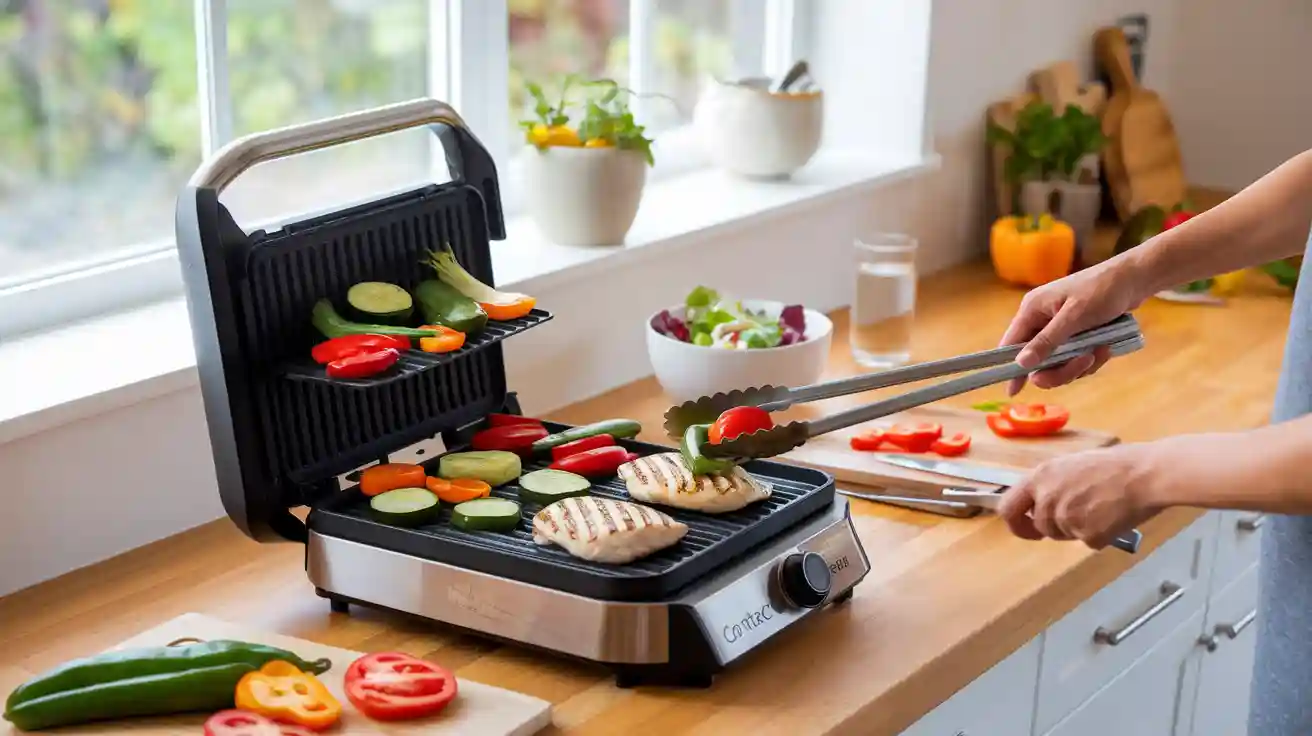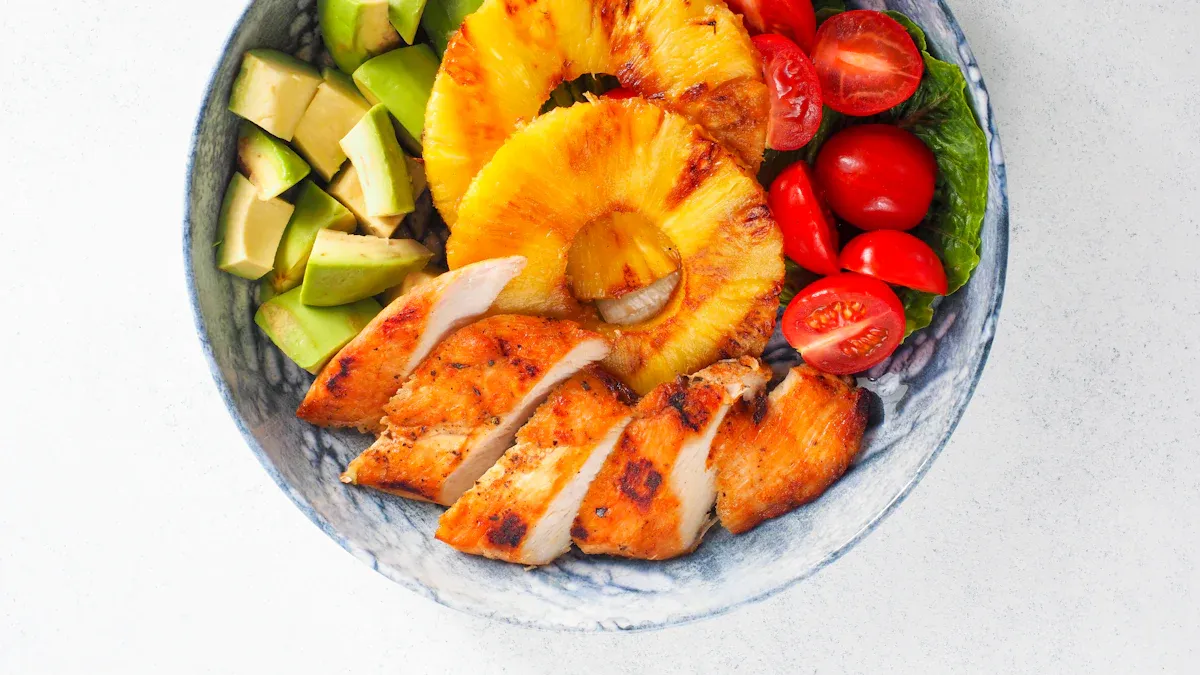
You want to make your meals healthier at home, right? A contact grill helps you do just that. This handy grill lets you enjoy tasty food with less fat. You keep more nutrients in your meals, too. With this cooking method, you make smart choices for your health.
Health Benefits of Using a Contact Grill
Fat Reduction Through the Fat-Dripping Mechanism
When you use a contact grill, you get one of the best health benefits right away. The grill presses both sides of your food at once. As the meat cooks, the fat melts and drips away from the food. You do not have to worry about the fat soaking back in. This means you eat less fat with every meal.
You can see the fat collect in the drip tray. That is fat you do not eat. If you want to eat less fat, this is a simple way to do it. The grill helps you enjoy juicy meat without all the extra grease. You get the health benefits of lower fat and fewer calories.
Tip: Always empty the drip tray after grilling. You will see just how much fat you are leaving behind!
Comparing Fat Content to Pan-Frying and Oven Cooking
Let’s look at how a contact grill stacks up against other ways to cook meat. When you pan-fry, you cook food in hot oil. The meat soaks up the oil, so you end up eating more fat and calories. Oven baking does not need extra oil, but the fat from the meat often stays in the pan. Some of it may drip away, but not as much as with a grill.
Here’s a quick comparison:
- Grilling lets fat drip off, so you eat less fat and fewer calories.
- Pan-frying adds fat because the meat absorbs oil.
- Oven baking keeps calories close to the natural level of the food, but some fat stays with the meat.
You get the best health benefits when you use a contact grill. You eat less fat, and your meals have fewer calories than pan-fried foods. The grill gives you a tasty way to enjoy meat while making a smart choice for your health. If you want to eat less fat, grilling is the way to go.
| Cooking Method | Fat Retention | Calorie Level | Health Benefits |
|---|---|---|---|
| Contact Grill | Low | Lower | Best for eating less fat |
| Pan-Frying | High | Highest | Least healthy |
| Oven Baking | Medium | Medium | Better than frying |
You can see that the contact grill offers the most health benefits. You get to enjoy your favorite meat dishes and still make a healthy choice for you and your family.
How a Contact Grill Helps Meat Retain Nutrients
Preserving Vitamins and Minerals in Meats
When you use a contact grill, you help your meat retain nutrients that your body needs. Grilling meat this way keeps important vitamins like thiamine (Vitamin B1) and riboflavin (Vitamin B2) in your food. These vitamins help your body turn food into energy and keep you healthy. Because the grill cooks both sides at once, your meat spends less time under heat. Shorter cooking times mean you lose fewer nutrients. You also do not need to add much fat, so your lean meats stay healthy and full of nutrition.
Grilling is one of the best ways to cook meat if you want to keep its nutritional value. You get great flavor and juicy results. Just remember, some nutrients can drip away with the juices, so try not to overcook your meat. If you want to make your meals even healthier, marinate your meat with herbs like rosemary or thyme. This can help lower the chance of harmful compounds forming at high heat.
Tip: Choose lean cuts of meat and avoid overcooking to keep more vitamins and minerals in every bite!
Nutrient Retention in Grilled Vegetables
You can also grill your veggies for a tasty and healthy side dish. Grilling vegetables on the grill gives them a smoky flavor and keeps them crisp. While some nutrients, like vitamin C and B vitamins, may decrease a bit due to the dry heat, you still keep more nutrients than if you boiled them. Steaming keeps the most vitamins, but grilling is better than boiling for holding onto nutrition.
Here’s a quick look at how different cooking methods affect vegetables:
| Cooking Method | Nutrient Impact on Vegetables | Key Points |
|---|---|---|
| Grilling | Up to 40% loss of B vitamins; some loss from juices | Great flavor, less nutrient loss than boiling |
| Steaming | Most vitamins kept, especially vitamin C and B vitamins | Best for nutrient retention |
| Boiling | Highest loss of water-soluble vitamins | Vitamins leach into water |
If you want to enjoy more nutrients, try to mix up your cooking methods. Still, vegetables on the grill taste amazing and make it easy to eat more veggies every day.
Lower Risk of Harmful Chemicals with Contact Grills
Less Smoke and Fewer Carcinogens
You might love the taste of grilled food, but did you know that traditional grilling can create harmful chemicals? When you cook meat over high heat or open flames, the process forms substances called HCAs and PAHs. These chemicals show up when meat gets charred or cooked for a long time. Fat drips onto hot coals, making smoke that carries these chemicals right back onto your food. Scientists have linked HCAs and PAHs to higher risks of cancer, including pancreatic and colon cancer. The more smoke and charring, the more of these chemicals you get.
A contact grill helps you avoid most of these problems. It cooks food quickly and evenly, so you do not need to use super high heat. You also get less smoke, which means fewer harmful chemicals land on your food. This makes your meals safer and better for your health.
Tip: Try not to overcook or burn your meat. You will keep your food tasty and lower your risk of harmful chemicals.
Safer Than Charcoal or Open-Flame Grilling
You want to keep your home and family safe. Charcoal and open-flame grills can be risky. They cause thousands of home fires every year. Many apartments and condos do not allow them because of fire hazards. Charcoal grilling also creates more PAHs and other pollutants, which can harm your lungs and heart.
A contact grill uses electricity, not fire. You do not have to worry about flames or smoke filling your kitchen. This makes it a safer choice, especially if you live in a small space. You also help protect your health by avoiding the extra chemicals and air pollution that come from burning charcoal.
Note: Electric grills like contact grills are allowed in many places where open flames are not. You get the taste you love without the risks.
Benefits of Less Added Fats and Condiments

Moisture Retention for Juicier, Healthier Results
When you use a contact grill, you keep more moisture in your food. This means your chicken, fish, or veggies stay juicy and tender. You do not need to add butter or heavy sauces to make your meal taste good. The grill’s design helps seal in natural juices, so your food does not dry out.
Keeping moisture in your food does more than just improve taste. It also helps lock in important nutrients and antioxidants. Scientists have found that contact grilling keeps more polyphenols and other healthy compounds inside your food. You get more of the good stuff with every bite. This is one of the big benefits of using a contact grill at home.
Tip: Try marinating your meat or veggies with lemon juice or vinegar before grilling. This simple step helps keep your food moist and can cut down on harmful compounds.
Enhancing Natural Flavors Without Extra Calories
Contact grilling brings out the natural flavors in your food. High heat caramelizes the natural sugars in fruits and vegetables, making them taste sweeter and richer. You do not need to drown your food in fatty condiments or sauces. A little seasoning or a splash of olive oil is enough.
This way, you enjoy all the benefits of great taste without adding extra calories. Using fewer added fats and condiments also lowers your risk of heart disease and high cholesterol. Choosing lean meats and trimming off extra fat gives you even more benefits. You get delicious, healthy meals that support your health goals.
Remember: The real flavor comes from the food itself. Let your contact grill do the work, and you will taste the difference.
Practical Tips for Maximizing Health Benefits with a Contact Grill
Choosing Lean Meats and Fish
You can make your meals healthier when you buy lean meats for your grill. Look for cuts like sirloin, tenderloin, or skinless chicken. Trim off any visible fat and always remove the skin from poultry. Fish is a great choice, too. It gives you protein, vitamin D, and omega-3s, which help your heart. Try to keep your portions to about 3 ounces, about the size of a deck of cards. Avoid processed meats like bacon or sausage. Marinate your meat or fish for at least an hour before cooking. This adds flavor and helps lower the chance of harmful compounds forming.
- Choose lean cuts of beef, chicken, or fish
- Trim visible fat and remove poultry skin
- Keep portions moderate (about 3 ounces)
- Use simple marinades and avoid heavy sauces
Grilling a Variety of Vegetables and Fruits
Your grill is not just for meat. You can cook many vegetables and fruits for a tasty and healthy meal. Try grilling zucchini, peppers, onions, mushrooms, or even corn. For fruits, peaches, pineapple, and watermelon taste great on the grill. Grilling brings out their natural sweetness and keeps their vitamins.
| Category | Best Choices | Tips for Grilling |
|---|---|---|
| Vegetables | Zucchini, peppers, onions, mushrooms, corn | Cut into even pieces, keep skin on |
| Fruits | Peaches, pineapple, watermelon | Brush with oil, grill last |
Using Healthy Marinades and Seasonings
You can boost flavor without adding unhealthy ingredients. Use olive oil, lemon juice, garlic, or fresh herbs for your marinades. Try a mix of soy sauce, ginger, and a touch of honey for chicken. Marinate seafood for 15 to 30 minutes. For meat, let it soak for a few hours. Always use a clean, nonreactive container and keep food in the fridge while marinating. Rubs made from herbs and spices also add flavor without extra fat.
Tip: Avoid heavy oils or sugary sauces. Simple, fresh ingredients work best.
Cleaning and Maintaining Your Contact Grill
A clean grill keeps your food safe and tasty. Clean the grill plates before and after each use. Use a nylon brush or scraper to remove food bits. Soak the plates in hot, soapy water for deep cleaning. Check for any damage or loose parts. Regular cleaning stops bacteria and allergens from building up. It also keeps smoke and harmful chemicals away from your food. Good maintenance helps your grill last longer and keeps your cooking healthy.
You get real health benefits when you use a contact grill at home.
- Fat drips away, so your meals have fewer calories.
- You keep more nutrients in your food.
- Grilling helps lower your risk of harmful chemicals.
With a few simple changes, you can enjoy tasty, healthy meals every day.
FAQ
Can you cook frozen food on a contact grill?
Yes, you can grill frozen food. Just add a few extra minutes to the cooking time. Always check that your food is cooked all the way through.
Do you need to use oil on a contact grill?
You do not need much oil. Most foods will not stick. If you want, brush a little oil for extra flavor or to help prevent sticking.
How do you clean a contact grill quickly?
Unplug the grill first. Wipe the plates with a damp cloth while they are still warm. For stuck-on bits, use a soft brush or sponge.
Tip: Clean your grill after every use. This keeps it working well and your food tasting great!


